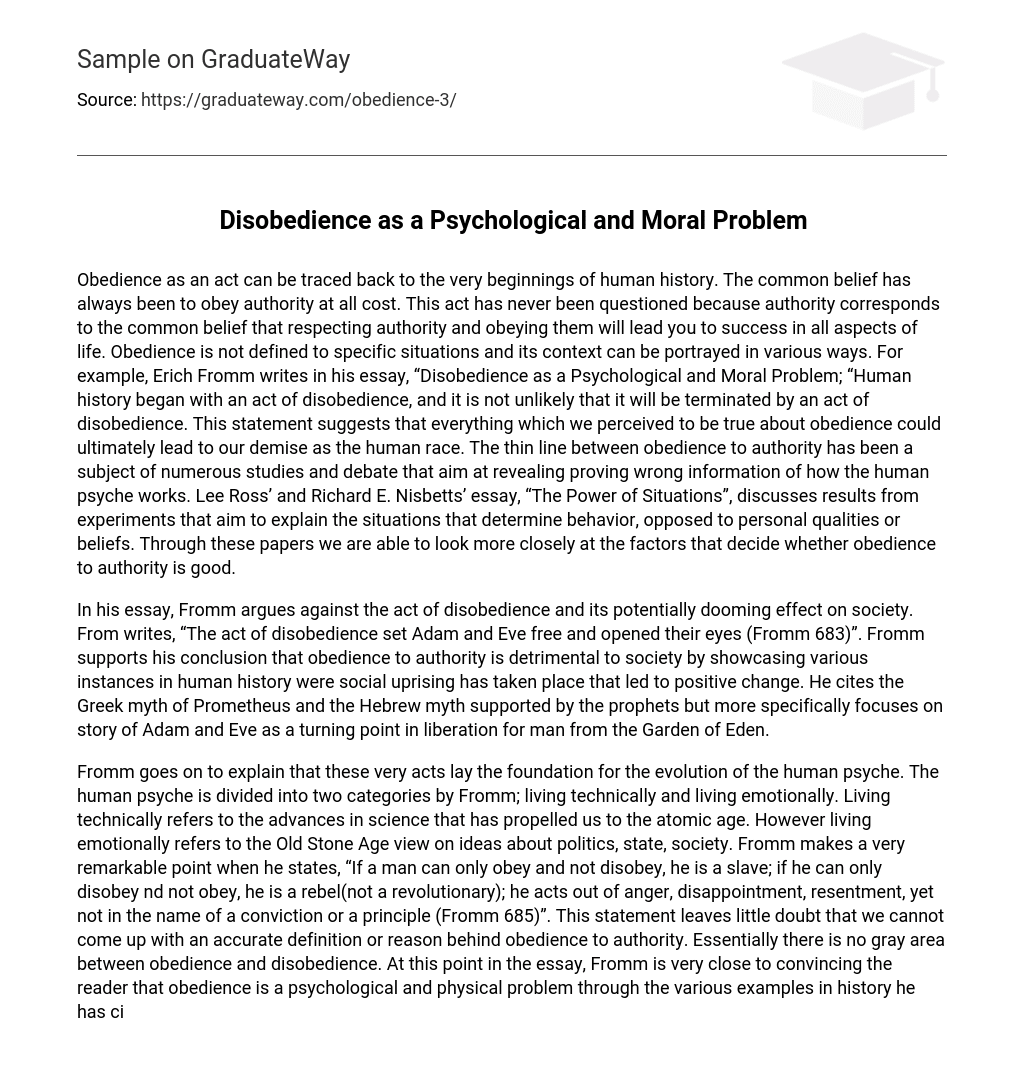Throughout human history, obedience has been regarded as essential, with the prevailing belief that one should unquestionably obey authority. This belief is rooted in the notion that showing respect and compliance towards authority figures will lead to success in all aspects of life. The concept of obedience extends beyond specific scenarios and can be demonstrated in various manners. Erich Fromm’s essay, “Disobedience as a Psychological and Moral Problem,” proposes that human history commenced with an act of disobedience and might potentially conclude with another act of disobedience. This implies that our comprehension of obedience could ultimately result in humanity’s downfall. The delicate boundary between obedience and authority has undergone extensive scrutiny and debate to challenge misconceptions about the functioning of the human mind. In their essay “The Power of Situations,” Lee Ross and Richard E. Nisbett discuss experiments aimed at elucidating how behaviors are influenced by circumstances rather than personal qualities or beliefs. Through analyzing these papers, we gain a more profound understanding of the factors determining whether obedience to authority proves advantageous.
In his essay, Fromm opposes disobedience and its potential destructive impact on society. Fromm states, “The act of disobedience liberated Adam and Eve and enlightened them.” Fromm reinforces his viewpoint that adherence to authority is harmful to society by providing examples from different periods in human history when rebellions occurred, resulting in positive transformations. He refers to the Greek myth of Prometheus and the Hebrew myth supported by the prophets, but particularly emphasizes the story of Adam and Eve as a pivotal moment in humanity’s liberation from the Garden of Eden.
Fromm argues that these actions are the foundation for the evolution of the human psyche, which he categorizes into two types: living technically and living emotionally. Living technically refers to scientific advancements that have led us to the atomic age. On the other hand, living emotionally refers to ancient views on politics, state, and society. Fromm makes a significant point when he states, “If a man can only obey and not disobey, he is a slave; if he can only disobey and not obey, he is a rebel (not a revolutionary); he acts out of anger, disappointment, resentment, yet not in the name of a conviction or a principle (Fromm 685).” This statement suggests that an accurate definition or reason for obedience to authority is elusive. There is no middle ground between obedience and disobedience. With the examples cited throughout the essay, Fromm comes close to convincing the reader that obedience is both a psychological and physical problem.
Fromm argues that disobedience is harmful to society. He supports his argument by describing two types of conscience that emerge when individuals face significant decisions. The first type is the authoritarian conscience, which represents the inner voice striving to please an authority figure due to fear. The second type, known as the humanistic conscience, can be understood as the voice in one’s mind that distinguishes between what is human and what is inhuman.
The text explores the difficulty of determining which conscience ultimately influences our behavior. Fromm suggests that following the ‘authoritarian conscience’ can limit our ability to reflect on ourselves, a characteristic of the ‘humanistic conscience’. Consequently, acts of terrorism, regardless of their scale, may be attributed to individuals who have an altered perception of their connection with others, influenced by factors such as power and greed. It is worth noting that obedience is not one of the aspects that contribute to this distorted understanding. The question about the benefits or drawbacks of obeying authority remains unanswered.
Decisions are influenced by the situations individuals encounter. There is a widespread belief that personal morals play a significant role in major decisions. Ross and Nisbett conducted experiments to substantiate their assertions. Undergraduates who enroll in a psychology course react favorably to it because they are exposed to fresh and fulfilling content. Conversely, as graduate students delve further into their studies of psychology, they realize that the research that initially fascinated them now profoundly captivates them and molds their thoughts.
This knowledge challenges common beliefs about human behavior, society, and the nature of the world. Ross and Nisbett argue that people tend to overvalue personality traits and undervalue situational factors when explaining behavior, a concept referred to as the ‘fundamental attribution error’. Additionally, this perspective provides a new understanding of obedience to authority by suggesting that other influences beyond individual characteristics play a role in people’s reactions.
To avoid conflating obedience to authority with moral and humanistic principles, it is crucial to recognize situational differentiations. According to Erich Fromm’s writings, obedience cannot be defined by one singular trait. Instead, Fromm delves into diverse topics concerning obedience, examining the psychological and human aspects that impact decision-making in relation to obeying authority.
Ross and Nisbett introduce the concept of the “fundamental attribution error” to explain that people’s reactions to situations are influenced by factors other than personal traits. They argue that obedience to authority should not always be regarded as a positive action since it is influenced by situational factors.





